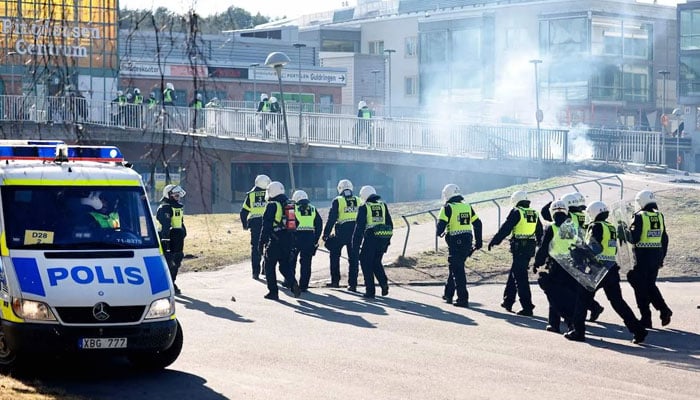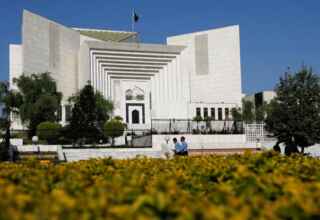
ISTANBUL/STOCKHOLM/ISLAMABAD: Condemnations continued to pour in from across the Arab and Islamic worlds over theburning of a copy of the Quran by a Swedish-Danish right-wing extremist in the Swedish capital, Stockholm.
Rasmus Paludan, the leader of the Stram Kurs (Hard Line) Party, burnt a copy of the Quran outside the Turkish Embassy in Stockholm on Saturday.
Saudi Arabia condemned the Swedish authorities for allowing the far-right politician to burn the Quran. In a statement, the Saudi Foreign Ministry affirmed “the kingdom’s firm position calling for the importance of spreading the values of dialogue, tolerance and coexistence, and rejecting hatred and extremism.”
The Egyptian Foreign Ministry decried the Quran burning as a “disgraceful act.” A ministry statement warned that this “disgraceful act provokes the feelings of hundreds of millions of Muslims around the world.” It said: “These extremist practices are inconsistent with the values of respectof others, freedom of belief, human rights and human fundamental freedoms.” Qatar also denounced in the strongest terms Sweden’s permission to burn the Quran outside the Turkish Embassy in Stockholm. “This heinous incident is an act of incitement and a serious provocation to the feelings of more than two billion Muslims in the world,” the Qatari Foreign Ministry said in a statement.
The United Arab Emirates (UAE) also condemned the incident and reiterated “its rejection of all practices aimed at destabilising security and stability in contravention of human and moral values and principles.” The UAE renewed its call to renounce hate speech and violence and underscored the need to respect religious symbols and avoid inciting hatred by insulting religions.
Oman termed the Quran burning as an “act of provocation to the feelings of Muslims and incitement to violence and hatred, by extremists in Sweden.” It underlined the need for international efforts to consolidate the values of tolerance and coexistence and criminalise all acts that promote the ideology of hatred.
Kuwaiti Foreign Minister Sheikh Salem Abdullah Al-Jaber Al-Sabah also condemned the Quran burning, saying the incident “hurts Muslims’ sentiments across the world and marks serious provocation.”
The Turkish Foreign Ministry condemned the burning of Islam’s holy book in Stockholm as a “vile attack.” “We condemn in the strongest possible terms the vile attack on our holy book, the Quran, in Sweden today (21st January), despite our repeated warnings earlier,” a ministry statement said.
In response to Sweden’s permission of the incident, Ankara cancelled Swedish Defence Minister Pal Jonson’s upcoming visit to Türkiye.
Iran also termed the Quran burning as an attempt to stoke hatred and violence against Muslims. Tehran said some European countries under the false pretext of advocating freedom of speech “allow extremist and radical elements to spread hatred against Islamic sanctities and values.”
Jordan joined the chorus of condemnations, stressing “the kingdom’s rejection of this act that fuels hatred.” Amman underlined the necessity to spread the culture of peace and acceptance of the other, adding that “condemning extremism is a collective responsibility.”
Morocco said it was “shocked” by the Swedish permission of the burning of Islam’s holy book. “This hateful act, which offends the sensibilities of more than a billion Muslims, can fuel anger and hatred between religions and peoples,” the Moroccan Foreign Ministry warned in a statement.
Pakistan termed the incident as a “senseless and provocative Islamophobic act that hurts the religious sensitivities of over 1.5 billion Muslims around the world.” Such actions are “not covered under any legitimate expression of the right to freedom of expression or opinion, which carries responsibilities under international human rights law, such as the obligation not to carry out hate speech and incite people to violence,” the Foreign Ministry said in a statement.
In a statement, Bangladesh’s Foreign Ministry condemned the “act of insulting the sacred values of the Muslims all over the world in the guise of ‘freedom of expression’.”
The Foreign Ministry of the interim Taliban government in Afghanistan also “strongly” condemned the burning and desecration of the Holy Quran and urged the Swedish government to punish the perpetrators of this act. In a statement, the ministry also urged Stockholm not to allow such people to take provocative actions against the Islamic religion and Muslims in the future.
The Organisation of Islamic Cooperation (OIC) also condemned the Quran burning as a provocative action that “targets Muslims, insults their sacred values, and serves as a further example of the alarming level reached by Islamophobia” and asked Sweden to punish those behind a “hate crime.”
Egypt’s Al-Azhar Al-Sharif, the highest seat of Sunni Islamic learning, also decried the Quran burning as a “shameful act” and a violation of “all international laws and covenants that stipulate the necessity of respecting the sanctities of peoples, their beliefs and their religions.”
It called for drawing up an international legislation “to ensure the necessary guarantees to protect the rights of Muslims to practice their religious rites in the societies where they live.”
The International Union for Muslim Scholars (IUMS) called on the Muslim countries to summon the Swedish ambassadors to demand an apology from the Swedish government over the incident.
Meanwhile, Sweden’s prime minister has condemned as “deeply disrespectful” the weekend burning of a Quran in Stockholm, which has raised tensions with Turkey as the Nordic country courts Ankara over its NATO bid.
Far-right politician Rasmus Paludan set fire to a copy of the Muslim holy book on Saturday in front of Turkey’s embassy in the Swedish capital.
Late on Saturday, Prime Minister Ulf Kristersson tweeted: “Freedom of expression is a fundamental part of democracy. But what is legal is not necessarily appropriate. Burning books that are holy to many is a deeply disrespectful act. I want to express my sympathy for all Muslims who are offended by what has happened in Stockholm today.”
Paludan’s demonstration has further damaged relations as Stockholm tries to convince NATO member Turkey to approve Sweden and Finland joining the military alliance.
Sweden’s bid has been stalled amid Ankara’s demands that Stockholm hand over Kurdish activists and prevent rallies attacking Turkey’s leadership. Dozens of protesters gathered late Saturday in front of the Swedish consulate in Istanbul, where they burned a Swedish flag and called on Turkey to sever diplomatic ties with Stockholm.
Indonesia condemned it, as did the Gulf Cooperation Council and the Organisation of Islamic Cooperation. Jakarta said “the act of blasphemy against the holy book has hurt and tarnished religious tolerance”, adding that “freedom of expression must be exercised in a responsible manner”.
Paludan, a Swedish-Danish activist who has already been convicted for racist abuse, provoked rioting in Sweden last year when he went on a tour of the country and publicly burned copies of the Quran.
Meanwhile, Ulema-Mashaykh and religious scholars of different religious schools of thought from all over Pakistan have strongly condemned the act of desecration of the Holy Quran in Sweden.
In a statement, Pakistan Ulema Council Chairman Hafiz Muhammad Tahir Mahmood Ashrafi, Ulema and Mashaykh from all over the country strongly denounced the desecration of the Holy Quran in Sweden, stating that this senseless and provocative Islamophobic act is unacceptable and this senseless act has hurt the religious sentiments of Muslims around the world.
Ulema and Mashaykh stated that these abhorrent acts cannot be covered in view of the expression of the right to freedom of expression or opinion. The religious leadership said that Islam is a religion of peace and Muslims including in Pakistan, believe in respecting all religions.
Special Aide to Prime Minister on Religious Harmony and Middle East Hafiz Muhammad Tahir Mahmood Ashrafi said the international community needs to show a common resolve against Islamophobia, intolerance and incitement to violence on the basis of religion or belief, and also needs to work together for promoting inter-faith harmony and peaceful coexistence.
Ulema and Mashaykh said that authorities concerned in Sweden should take action against elements that supported the desecration of Holy Quran. “We urge them to be mindful of the sentiments of the people of Pakistan and the Muslims worldwide and take steps to prevent Islamophobic acts,” the Ulema and Mashaykh stated.







